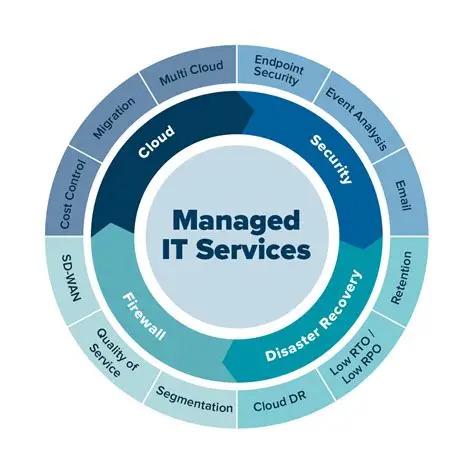How Managed IT Services Protect Your Business from Cyber Threats

In today’s hyperconnected world, cyber threats are no longer a concern just for large corporations. Small and medium-sized businesses are increasingly becoming targets for hackers seeking to exploit weak security systems, outdated software, or untrained employees. The stakes are high—data breaches can cripple operations, damage customer trust, and lead to severe financial losses. This is where Managed IT Services step in as a powerful shield against cyberattacks.
Understanding Managed IT Services
Managed IT Services refer to outsourcing your company’s IT management and cybersecurity needs to a professional provider. These experts handle everything from network monitoring and data backups to software updates and threat response. Unlike the traditional “break-fix” approach—where help is sought only after a problem occurs—managed services operate on a proactive model, continuously monitoring systems to prevent issues before they arise.
With a Managed Service Provider (MSP), businesses gain access to enterprise-level security tools, experienced IT professionals, and 24/7 monitoring—without the high costs of maintaining an in-house team. But more importantly, MITS builds a defensive ecosystem that protects your business from a constantly evolving threat landscape.
1. Continuous Network Monitoring and Threat Detection
Cybercriminals work around the clock, and so should your protection. Managed IT providers offer 24/7 network monitoring, which ensures that every piece of traffic entering or leaving your network is analyzed for suspicious behavior.
Using tools such as Intrusion Detection Systems (IDS) and Security Information and Event Management (SIEM) software, MSPs can quickly identify anomalies—like unusual login attempts or data transfers—and neutralize threats before they cause harm.
Early detection is critical. Whether it’s ransomware, phishing, or insider threats, real-time monitoring helps businesses stay one step ahead, minimizing downtime and safeguarding sensitive data.
2. Advanced Endpoint Security
Every device connected to your network—computers, smartphones, tablets, even IoT equipment—can be an entry point for attackers. Managed IT Services deploy endpoint protection platforms that include next-generation antivirus, malware scanning, and behavior-based threat detection.
These systems automatically quarantine infected files and alert technicians before the issue spreads.
Additionally, MSPs ensure that software patches and security updates are installed promptly, closing vulnerabilities that hackers often exploit. With employees increasingly working remotely, endpoint management is essential to maintain consistent security across every device and location.
3. Robust Data Backup and Disaster Recovery
Even with the best defenses, breaches or hardware failures can occur. Managed IT Services mitigate potential damage through automated data backup and recovery solutions. Regularly scheduled backups—stored both on-site and in secure cloud environments—ensure that your critical information is always retrievable.
If a ransomware attack or system failure happens, your MSP can quickly restore data and get your business running again with minimal disruption. A solid Disaster Recovery Plan (DRP) not only protects against data loss but also ensures compliance with data protection regulations such as GDPR or HIPAA.
4. Strong Email and Web Security
Email remains one of the most common entry points for cyberattacks. Phishing schemes and malicious attachments can easily bypass unprotected inboxes. Managed IT Services deploy advanced spam filters, sandboxing tools, and AI-driven scanners that inspect links and attachments in real time, stopping phishing attempts before employees even see them.
Similarly, MSPs use web filtering solutions to block access to dangerous or non-work-related sites that could host malware. These proactive steps drastically reduce the risk of social engineering attacks and human error—the leading cause of security breaches.
5. Employee Awareness and Training
Even the most advanced security system can be undermined by an uninformed employee. Managed IT providers often include cybersecurity awareness training as part of their service. These sessions teach staff how to identify suspicious emails, handle confidential data responsibly, and follow password best practices.
By cultivating a security-first culture, businesses empower employees to become the first line of defense rather than a vulnerability. Regular simulated phishing exercises help reinforce these lessons and measure employee readiness.
6. Compliance and Risk Management
Businesses operating in regulated industries—such as healthcare, finance, or legal services—must adhere to strict compliance standards for data protection. Managed IT Services help ensure compliance with frameworks like HIPAA, PCI DSS, and ISO 27001, reducing the risk of legal penalties and reputational damage.
MSPs perform risk assessments and maintain audit trails to demonstrate compliance readiness. They also help design access control systems and data encryption policies that protect both your business and your clients.
7. Cost Efficiency and Scalability
Cybersecurity tools, monitoring software, and in-house IT staff can be expensive. Managed IT Services offer a cost-effective solution through predictable monthly pricing models, giving businesses access to enterprise-grade security without large capital expenditures.
As your company grows, MSPs can scale their services to meet new demands—adding users, expanding storage, or increasing protection layers without disrupting daily operations.
8. Rapid Incident Response and Recovery
In the event of a cyber incident, response time is everything. Managed IT Services include Incident Response (IR) capabilities that immediately isolate affected systems, stop malicious activity, and begin forensic analysis.
This swift action minimizes downtime and ensures lessons are learned to prevent future attacks. A reliable MSP will also provide post-incident reporting to help you understand what happened, why, and how your security posture can be improved.
Conclusion
Cyber threats are growing in number, sophistication, and cost. From ransomware to phishing, no business is too small to be targeted. Partnering with a trusted Managed IT Service Provider transforms your cybersecurity from reactive defense into proactive resilience.
Through continuous monitoring, regular backups, expert guidance, and employee training, Managed IT Services give you peace of mind—knowing that your data, reputation, and operations are protected. In a digital world where threats evolve daily, a proactive managed service isn’t just an option—it’s a necessity for business survival.
- Sports
- Art
- Causes
- Crafts
- Dance
- Drinks
- Film
- Fitness
- Food
- Spellen
- Gardening
- Health
- Home
- Literature
- Music
- Networking
- Other
- Party
- Shopping
- Theater
- Wellness


